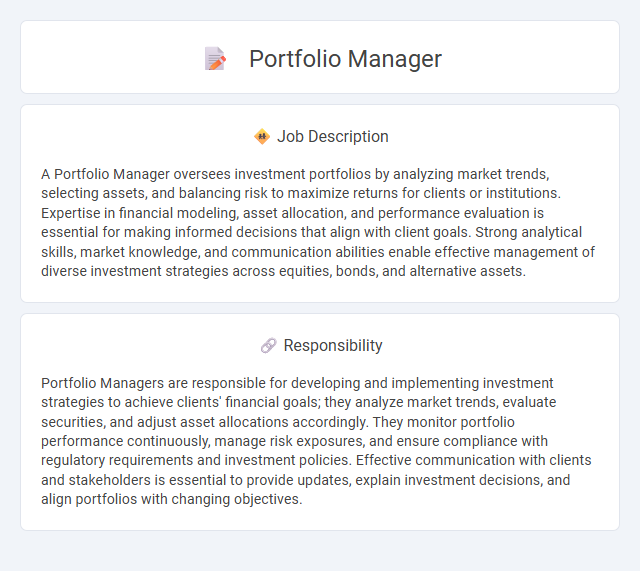
A Portfolio Manager oversees investment portfolios by analyzing market trends, selecting assets, and balancing risk to maximize returns for clients or institutions. Expertise in financial modeling, asset allocation, and performance evaluation is essential for making informed decisions that align with client goals. Strong analytical skills, market knowledge, and communication abilities enable effective management of diverse investment strategies across equities, bonds, and alternative assets.
Individuals with strong analytical skills and a keen interest in financial markets are likely to be suitable for a Portfolio Manager role. Those who thrive under pressure and can make decisions based on data and market trends might find this career fulfilling. However, candidates who prefer routine tasks or struggle with risk assessment may find the responsibilities challenging.
Qualification
A successful Portfolio Manager typically holds a CFA charter or a master's degree in finance, economics, or business administration, combined with several years of experience in investment analysis and asset management. Proficiency in financial modeling, risk assessment, and knowledge of global markets are essential qualifications that enhance decision-making and portfolio optimization. Strong analytical skills, attention to detail, and excellent communication abilities contribute to effective client relationship management and performance reporting.
Responsibility
Portfolio Managers are responsible for developing and implementing investment strategies to achieve clients' financial goals; they analyze market trends, evaluate securities, and adjust asset allocations accordingly. They monitor portfolio performance continuously, manage risk exposures, and ensure compliance with regulatory requirements and investment policies. Effective communication with clients and stakeholders is essential to provide updates, explain investment decisions, and align portfolios with changing objectives.
Benefit
A Portfolio Manager is likely to experience significant benefits such as enhanced financial expertise and decision-making skills. They probably gain exposure to diverse asset classes, improving their strategic investment abilities. This role may also offer competitive compensation and opportunities for career advancement in the financial sector.
Challenge
The role of a portfolio manager often presents significant challenges due to the need to balance risk and return while adapting to rapidly changing market conditions. It is likely that they must analyze complex financial data and make swift decisions under uncertainty to optimize investment performance. Navigating regulatory changes and client expectations may also pose ongoing challenges in this demanding position.
Career Advancement
Portfolio Managers play a crucial role in managing investment portfolios to maximize returns and minimize risks through strategic asset allocation and market analysis. Career advancement in this field typically involves progressing from junior analyst roles to senior portfolio manager positions, often requiring strong quantitative skills, certifications like the CFA, and proven performance track records. High-performing Portfolio Managers can advance into executive roles such as Chief Investment Officer or start their own investment firms, leveraging extensive market expertise and leadership abilities.
 kuljobs.com
kuljobs.com